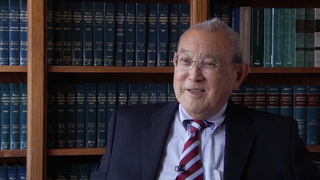Interviews
Closing the Korematsu Case
And at the conclusion, after he sat down, Judge Patel had already decided the case and read the statement that became the basis of her later written opinion about this. And she read it, and it was basically that the petition had raised serious issues of government misconduct. The record was there from the government's files. And one thing she said was, her last sentence, her paragraph, you know, "The Korematsu case remains on our law books, but it is a reminder to all of us of what can happen during wartime, that no group should be treated this way." And at the conclusion of that, she simply stood up and left the courtroom.
And most of us for a brief, seemed like a while, just sat there sort of speechless. And then everybody got up and there was tremendous excitement. People were crying. Everybody was running up to congratulate Fred, pound him on the back. It was really almost like a, like a party. ... Well, I remember being just flooded with emotion, being really overcome. I wasn't sure in fact that I could even speak to the press or anybody else. And I just felt overjoyed at what had happened. And in a way, of course, it occurred to me that this, I had started all of this without any real intention at the beginning. As I said, a whole series of fortuities and accidents building up, leading to this. But also just looking around. I remember sort of standing back and looking around at this audience, almost all Japanese American, and just seeing how much this affected them.
Date: October 27, 2000
Location: Washington, US
Interviewer: Alice Ito, Lorraine Bannai
Contributed by: Denshō: The Japanese American Legacy Project.



